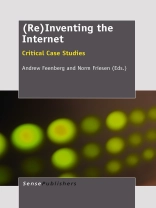Although it has been in existence for over three decades, the Internet remains a contested technology. Its governance and role in civic life, education, and entertainment are all still openly disputed and debated. The issues include censorship and network control, privacy and surveillance, the political impact of activist blogging, peer to peer file sharing, the effects of video games on children, and many others. Media conglomerates, governments and users all contribute to shaping the forms and functions of the Internet as the limits and potentialities of the technologies are tested and extended. What is most surprising about the Internet is the proliferation of controversies and conflicts in which the creativity of ordinary users plays a central role. The title, (Re)Inventing the Internet, refers to this extraordinary flowering of agency in a society that tends to reduce its members to passive spectators. This collection presents a series of critical case studies that examine specific sites of change and contestation. These cover a range of phenomena including computer gaming cultures, online education, surveillance, and the mutual shaping of digital technologies and civic life.
قائمة المحتويات
Preface; I. Code and Communication 1. Introduction: Toward a critical theory of the Internet; II. Play and School Online 2. Rationalizing play: A critical theory of digital gaming; 3. Alternative rationalisations and ambivalent futures: A critical history of online education; III. The Civic Internet 4. Experiencing surveillance: A phenomenological approach; 5. Subactivism: Lifeworld and politics in the age of the Internet; 6. Hacking for social justice: The politics of prefigurative technology.












